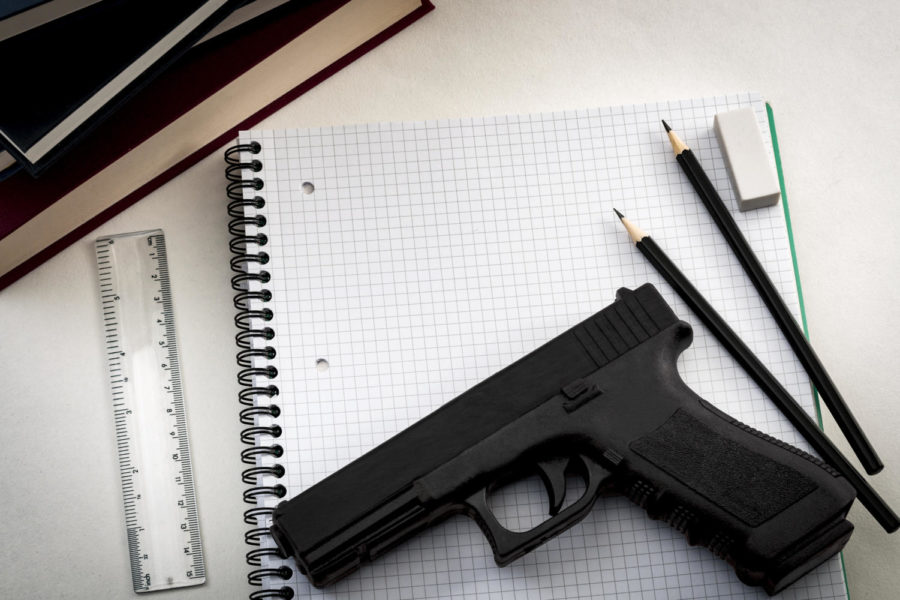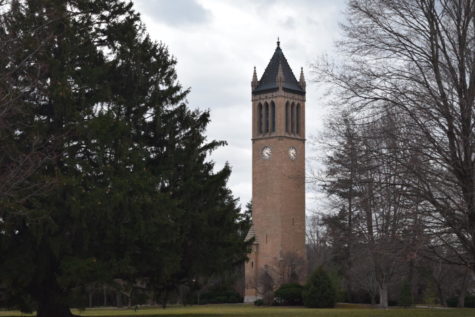Guest Column: Why do we restrict weapons on campus?
Guest columnist Daniel Eisenstein questions why guns aren’t allowed on campus despite surrounding federal and state legislation.
August 17, 2020
According to the United States Concealed Carry Association, there are approximately 371,000 people permitted to carry a weapon in the state of Iowa. That is about one in every nine Iowa residents who are permitted to carry a weapon, including children that cannot be granted a permit and other legally non-eligible people. Despite the prevalence of these permits in the state of Iowa, the Iowa Board of Regents prohibits nearly anyone from bringing a weapon onto a regent university campus through threats of severe reprimands, and Iowa State University mirrors this policy with a few rare exceptions. These restrictions apply whether someone is permitted to carry a weapon or not. While tightly restricting weapons on campus may sound like a rational safety measure, it makes little sense when broken down.
To be eligible for a permit to carry a weapon, one needs to be over the age of 21, have a criminal record free of any felony or misdemeanor crimes of domestic violence, complete a firearm safety and handgun training class and a few other qualifiers laid out in Iowa Legal Code § 724.8. According to enrollment data from the fall 2019 semester, 16,667 students, making up 58.91 percent of the student body, were under, not including, the age of 21. That means, regardless of other potential disqualifiers, only 41.09 percent of the student body met the age requirement for a permit to carry a weapon.
One of the shallower concerns I have heard regarding a prospective repeal of on-campus weapon restrictions is the idea that the presence of weapons will cause a distraction or make people nervous. As I said before, one out of every nine people are licensed in the state of Iowa to carry a weapon. That means any time you wander off the campus, you can assume that one out of every nine people have a weapon. That may come as a surprise, as you do not see one out of every nine people toting around firearms. The open carry of firearms tends to draw unwanted attention, so most people keep them concealed. If you are comfortable with wandering anywhere off-campus, you would be comfortable with a repeal of the weapon-restrictions on campus.
After all, the presence of a firearm is not what scares people. Rather, it is the fear of that firearm being misused. The Campaign to Keep Guns Off Campus is a lobby group that regularly publishes a list of firearm-related incidents on campuses that allow weapons to some degree. Most of the 35 incidents have nothing to do with the allowance of firearms on a given campus, like the seventh incident, which details a situation where a student was shot by police as he approached them with a knife; the fifteenth incident, where a student found a backpack with handgun magazines, ammunition and a knife on move-in day or the seventeenth incident, where a handful of cartridge casings were tossed outside of a building. Only 11 of the incidents involved those licensed to carry their weapon, and only one resulted in someone else being injured. Still, the fact that a lobby-group hell-bent on upholding university weapon restrictions could only find 11 incidents across the ten states that, to some degree, allow firearms on their public university campuses reveals how uncommon these incidents are.
A weapon restriction on campus can only influence people who are incentivized to follow the rules. Students, staff and faculty have their educations or occupations on the line. They are incentivized to keep their weapons off campus, whether they are permitted to carry them or not. However, it would be foolish to believe that a weapon restriction on campus would repel anyone determined to commit an act of violence. That is an act with far greater criminal repercussions than the university expelling or firing that person. In other words, the risk of a crime involving the use of a firearm has, is and always will be assumed regardless of university policies.
Some substantial progress was already made toward repealing on-campus weapon restrictions. Last year, Iowa Legal Code § 724.8A was introduced. This section of state law requires that all Iowa regent universities and community colleges do not prohibit electrical weapons that do not fire a projectile. Before the fall 2019 semester, possessing one was an expellable or fireable offense. Today, the university is legally obligated to let students own and carry non-projectile electrical weapons with exceptions for convicted felons, stadiums and hospitals.
It should be noted that unlike other weapons in the state of Iowa, according to Iowa Legal Code § 724.4(4)(l), anyone over the age of 18 years can carry a non-projectile electrical weapon with or without a permit. Is this change to university policy enough, you may ask? I do not believe so.
Non-projectile electrical weapons are not optimal in a self-defense situation. They are only effective as long as a victim only has to handle one assailant who has exposed skin within an arm’s reach. In our era, the fact is that no tool is more effective for self-defense than a firearm held by someone who knows how to handle it. But still, the changes in the law and university policy highlight that we are moving in the right direction.
It is apparent Iowa State University greatly values our constitutional rights as students, like our right to freedom of speech and our right to vote. Of course, the institution receives state and federal funding, and it is their legal obligation to protect these rights given judicial precedent, state and federal law. Despite these obligations, it perplexes me that a licensed student’s right to carry a firearm becomes nullified the moment they step onto public campus property.
What is even more ironic is that the state of Iowa allows concealed weapons to be carried by permitted individuals in state parks, establishments serving alcohol and even the state capitol building. While the Iowa Board of Regents is also to blame, and there are not yet any statutes or legal cases requiring university weapon restrictions to be repealed, the restrictions currently in effect reek of ignorance and short-sighted logic.
The facts are that one in every nine Iowa residents are permitted to carry a weapon in public, the odds of an incident occurring as a result of a weapon restriction repeal are incredibly slim and the honor system policy we have now does nothing to phase prospective criminals. These facts are the reason I ask, why do we restrict weapons on campus?
Daniel Eisenstein is a junior in management information systems.















